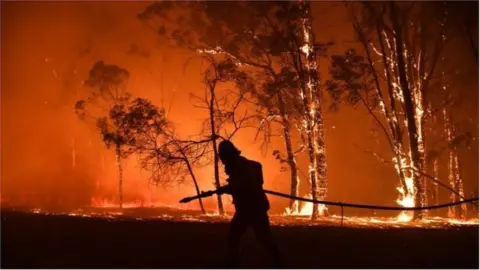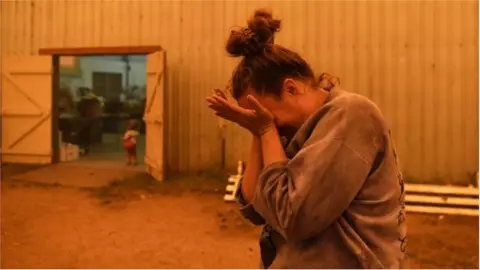Australia fires: NI-born firefighter says devastation widespread
A New South Wales firefighter, originally from Ballyclare in County Antrim, has told the BBC that the devastation caused by the Australian bush fires is "indescribable".
At least 24 people have died and thousands of properties destroyed since the fires began in September.
Roger Park said he managed to single-handedly save his home in the Australian town land of Yowrie.
The area is about 15 miles from the fire-ravaged town of Cobargo.
Last week, Prime Minister Scott Morrison had to cut short a visit to the area after being heckled by locals.
Speaking on the BBC's Good Morning Ulster programme, Mr Park said the fire reached Yowrie at about 03:00 local time last Tuesday.
"That morning, it was 35 degrees at one in the morning before the fire front came," he said.
When he and others made calls to establish where the fire was located, they were shocked to discover it was 10km closer than they had initially thought.
 EPA
EPA"There was no official emergency warning [at that point]," he said.
As the fire approached, he realised how severe it was as "it sounded like a jet engine from five kilometres away".
"It's a noise that you'll never forget," he added.
"A large bush fire creates its own weather, it creates its own wind, it starts to draw its own air as it swirls."
Knowing the fire was close, he moved his 12-year-old son, Riley, to Cobargo, which at that point seemed safe.
"My wife and eldest son were in Sydney, thankfully, but my youngest son decided to stay with me, so I had to evacuate him to his friend's place in Cobargo," he said.
Half of Mr Park's Rural Fire Service brigade, which is made up of unpaid volunteers, had moved to assist in a town further south, so he battled the fire on his 200-acre farm alone.
"I had a plan in place and all the equipment and training," he said.
'We're not smiling much'
The training and equipment helped him to guide the fire around his property, ultimately saving it and most of the animals, although much of his farmland was destroyed.
Mr Park, a zoologist and contractor at a national parks and wildlife service, explained that when he bought the property, he knew it was in "one of the most bushfire prone areas on the planet", so he took every precaution in terms of fire defences.
"I built a house with toughened glass windows, steel cladding, steel frame, fire retardant insulation and a safe haven below," he said.
About 30,000 litres of water were used in the hour that it took to save his and neighbouring properties.
"I was able to save my dogs and my cat, most of my chickens and my kids' guinea pigs, which was a relief," he said.
More than 100 homes were lost in his small town land area and he said he was aware of three fatalities.
 Reuters
ReutersHe kept a video diary of the fire as it approached his house and of the devastation left in the immediate aftermath.
As the threat to his own village passed, Mr Park then realised the town of Cobargo, where Riley was staying with friends, also had an emergency warning and he could not return to it.
Luckily, his son was unharmed and managed to return home to Yowrie, where neighbours have been taking care of him while his father continued to fight fires in the area.
"My son's okay, my family's okay. We're not smiling much but the dark Northern Irish sense of humour comes out now and again," he said.
"We're now in a safe place called the burnt ground - once it's burned it can't burn again. The smoke hasn't lifted yet, but the devastation is widespread."
Describing the scale of the blaze, he said: "This went from a 10,000 hectare fire to a 200,000 hectare fire in under 12 hours. It rolled down the hill of my neighbour at about 30km per hour."
